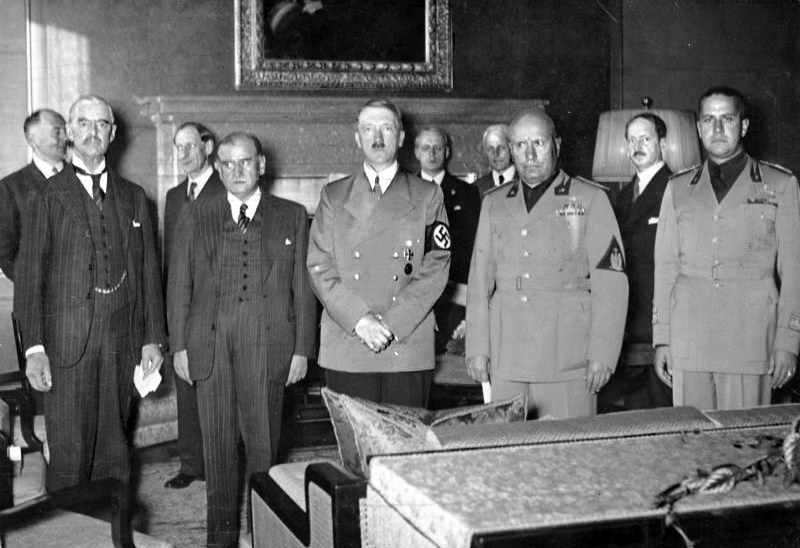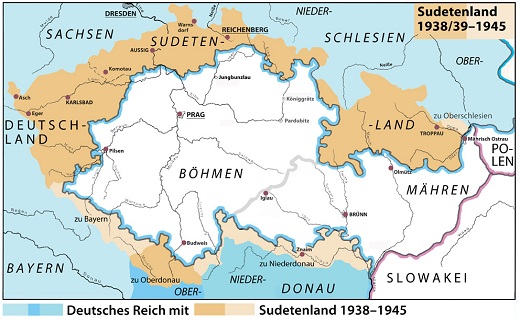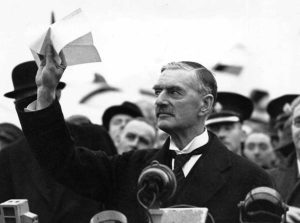[This is an updated version of an earlier article on this topic]
“Those who cannot remember the past are condemned to repeat it! “(George Santayana-1905)

29 Sep 1938 (German Federal Archives)
The Munich Conference of 1938 saw both Britain and France abandon its ally Czechoslovakia forcing them to cede part of their territory to Germany to avoid war. Let’s look at what the situation was in 1938 and why this happened.
By 1938 there was no doubt anymore about the intentions of Germany’s Third Reich and Adolf Hitler. European nations were generally worried about a major war and to that end the two biggest powers in Europe -France and Great Britain- sought to avert it. It was based on the experience of the First World War in which millions had died. The aftermath of that war was a sentiment that total war must be averted at all costs. So far all of Hitler’s violations of treaties, such as occupying the Rhineland in 1936, had caused no major retribution even if it was a major violation of the Treaty of Versailles that Germany had agreed to in 1918. Nor had rearming Germany, also a violation of the treaty, caused any significant reaction.
While worldwide opinion of their open antisemitism was negative, they successfully held the 1936 Olympics in Germany. This despite the fact Germany was a fully authoritarian state ruled by the Nazi Party. All private schools (including religious ones) were shuttered forcing all children to go to the public school. All major corporations and businesses that were controlled by Jews were systematically targeted and forced to sell to Germans backed by the Nazi Party. All media was likewise controlled and could only report exactly what the Reich Propaganda Ministry told them to report. Movies, radios, and newspapers repeated only what was allowed to be reported or dramatized. American movies, in order to be shown in Nazi Germany, had to comply with Nazi rules which prohibited showing Jews in a positive light, criticize German policy in any way, or show any theme the Nazi Party objected to.
As Germany re-armed, it looked to expand its frontiers and bring into being a Greater Germany. Hitler was Austrian and both countries had close ties sharing a common language and culture. Many in Austria already supported such an idea long before the Nazi’s came into power. The Nazi’s had tried in 1934 in supporting a coup attempt, but it failed. By 1938 Germany was in a better position. Politicians and groups sympathetic to Hitler and unification in Austria were loudly calling for it. Austrian chancellor Kurt Schuschnigg hoped that a referendum on the issue set for 13 March 1938 would resolve it. Hitler instead threatened to invade and through his agents asked him to resign. The referendum was canceled and on 12 Mar 1938, German troops entered Austria and were unopposed. The long-wanted Anschluss had finally occurred. Neither Great Britain nor France was willing to offer any assistance to stop it from happening. In fact, many supported it in those countries.

Stamp Collecting World (via Wikipedia)
About the same time, Hitler was also claiming that German-speaking people living in Sudeten region of Czechoslovakia wanted closer ties with Germany. And that if this land was not given to Germany, it would have to be done by force. Needless to say the Czechoslovakian government was alarmed especially after what happened to Austria. Leaders in both Britain and France were becoming alarmed that this could spiral into a general war. The position of both governments was to avoid total war; they did not want another World War I that devastated Europe. This policy of appeasement had many supporters in politics, academia, and the media. Those who argued against it were called warmongers, or worse. The problem was that both countries had signed treaties with Czechoslovakia that if they were attacked, their enemy became theirs. Hitler knew this and stepped up the pressure.
Hitler ordered his generals to come up with a plan to attack Czechoslovakia. It was set to commence in October. Meanwhile Czechoslovakia tried to gauge the support it had and found Poland would only assist if the French did. And the French were reluctant to support Czechoslovakia if it meant direct conflict with Germany. Britain was also cool on the idea and forced President Benes to accept an arbitrator. Benes feeling he had no choice, gave in to the idea. Lord Runciman was sent to Prague on 3 August 1938 to persuade Benes to accept a plan for Sudeten Germans. In public both powers appeared to support Czechoslovakia but in private made it clear they would not go to war with Germany over the Sudetenland. As German forces appeared to be poised to invade, it was clear to both London and Paris something would have to give.
Hitler continued upping the pressure by giving speeches that blamed the crisis in Sudetenland on Czechoslovakia. He denounced the state as illegitimate, that it was targeting the German speaking people for extermination, and many other things as well. German media was full of stories that depicted the heroic German people in Sudetenland as suffering and that other nationalities would be targeted as well. Hitler made it clear that the situation could no longer be tolerated, and that Germany was prepared to resolve it if either Czechoslovakia or the other powers involved failed to stop the atrocities. German troops were poised to resolve the situation. And Hitler surmised both the British and French would deal to avoid war.
With Europe seemingly on the edge of war, this precipitated the Munich Conference of September 1938. Without consulting with Czechoslovakia, British leader Neville Chamberlain and French president Edouard Daladier decided to resolve this situation by agreeing that any territory in the Sudetenland that had over fifty percent German speaking people would be given to Germany. Italian dictator Benito Mussolini, also at the conference, argued for a German military presence along with an international commission to resolve disputes (this was a German proposal but felt that it was better made by the Italians).
It was formally agreed to on 30 Sep 1938. Czechoslovakia was presented with this agreement and had no choice but to accept or face immediate invasion. Czechoslovakia found itself totally alone and the two powers-Britain and France-who had pledged to protect them now abandoned them to their fate. They had no choice but to accept but left an awful taste in their mouths knowing they had been betrayed. It would end with President Benes resigning in October knowing his country was to be invaded by Germany. This would occur in March 1939. The Germans would hold the Sudetenland until 1945. Chamberlain would proclaim later, upon arrival in Britain, that he delivered “peace for our time.” Daladier more or less concurred and later France would sign a non-aggression pact with Germany.
Aftermath

Image: winstonchurchill.org
Germany acquired not only territory but the industrial resources that it needed (raw ore, steel and iron production, electrical plants). Czechoslovakia was diminished as a result. While many in public in Britain and France heralded the agreement as avoiding war, there were warnings it was wrong. Winston Churchill was critical of the deal and how they had abandoned Czechoslovakia to Hitler. The British Labor Party opposed the deal as well. A view began to emerge and would continue long after, that Britain and France wanted to get out of the military pact as they were not ready for war. Was Hitler bluffing or not also is discussed as well. The evidence is that Germany could have invaded but got what it wanted without firing a shot. And it was handed to Hitler on a platter by two powers that in the last war had been Germany’s enemies. It could not have been a greater present for Hitler.
Czechoslovakia was doomed by the pact. In October 1938, it was forced to hand over under the Vienna Award territory in its south to Hungary and a small concession to Poland. In March 1939, after Slovakia seceded to become a pro-German state, Hitler demanded Czechoslovakia accede to German occupation, which it did. Czechoslovakia then became a protectorate of the Third Reich. Churchill’s warning had come true. With his policy of appeasement now deemed a total failure, Neville Chamberlain realized that it was time to mobilize for war. The French would likewise prepare (but so entrenched was the avoidance of total war doctrine failed to act when it had the option to do so when most of the German army was invading Poland). In September 1939, World War II would officially begin with the invasion of Poland and declaration of war by Britain and France on Germany.
Both Chamberlain and his French counterpart would live to see how badly it would turn out. After war broke out, Chamberlain’s popularity fell and would resign as Prime Minister on 10 May 1940 and replaced by Winston Churchill though remained in the Cabinet. He would die in November 1940. Édouard Daladier, who was under no illusions as to Hitler’s goals (but knew support for standing up to Hitler was thin), had resigned his position in March 1940 but was still minister of defense when Germany invaded. He would be arrested and charged with treason by the German supported Vichy government and imprisoned. He would be imprisoned in several places, including the Buchenwald concentration camp and ended up in Itter Castle in Tyrol with other French dignitaries until liberated on 5 May 1945 after the Battle of Itter . He would return to the Chamber of Deputies after the war, served as mayor of Avignon, and died in Paris in 1970.
Sources
“Munich Agreement | Definition, Summary, and Significance.” Encyclopedia Britannica, 20 July 1998, www.britannica.com/event/Munich-Agreement.
Mullen, Matt. “Munich Pact Signed.” HISTORY, 28 Sept. 2020, www.history.com/this-day-in-history/munich-pact-signed.
Munich Agreement. encyclopedia.ushmm.org/content/en/timeline-event/holocaust/1933-1938/munich-agreement.
The British Policy of Appeasement Toward Hitler and Nazi Germany. encyclopedia.ushmm.org/content/en/article/neville-chamberlain.
“Munich Agreement.” Wikipedia, 13 Jan. 2024, en.wikipedia.org/wiki/Munich_Agreement.



